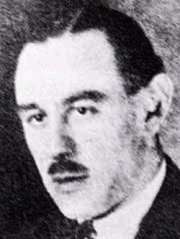|
Biography Philip MacDonald
Philip MacDonald (November 5, 1900, London ‚ÄĒ December 10, 1980, Woodland Hills, California) was an English author of thrillers.
MacDonald was the grandson of the writer George MacDonald and son of the author Ronald MacDonald and the actress Constance Robertson. During World War I he served with the British cavalry in Mesopotamia, later trained horses for the army, and was a show jumper. He also raised Great Danes. After marrying the writer F. Ruth Howard, he moved to Hollywood in 1931. He was one of the most popular mystery writers of the 1930s, and between 1931 and 1963 wrote many screenplays along with a few radio and television scripts.
His detective novels, particularly those featuring his series detective Anthony Gethryn, are primarily "whodunnits" with the occasional locked room mystery. His novel X v. Rex (1933), aka The Mystery of The Dead Police, is an early example of what has become known as a serial killer novel (before the term "serial killer' was coined), in which an insane murderer is killing police officers one after the other. "Perhaps his best-known novel is The List of Adrian Messenger."
His work in screenwriting included not only screenplays based on his own works (such as The Mystery of Mr. X in 1934, Who Killed John Savage? in 1937, based on The Rynox Mystery, and many others) but also original stories and screenplays for series characters such as Charlie Chan (Charlie Chan in London, 1934, and Charlie Chan in Paris, 1935) and Mr. Moto (Mysterious Mr. Moto in 1938, Mr. Moto's Last Warning and Mr. Moto Takes a Vacation in 1939). He did not receive any screen credit for his work in adapting Bride of Frankenstein. He adapted a story written by Agatha Christie for the movie Love From A Stranger (1947). MacDonald and Michael Hogan adapted the novel Rebecca by Daphne du Maurier, from which Robert E. Sherwood and Joan Harrison created the screenplay for Rebecca, the 1940 film. Sherwood and Harrison were nominated for an Academy Award.
In later years MacDonald wrote television scripts for Alfred Hitchcock Presents ("Malice Domestic", 1957) and Perry Mason ("The Case of the Terrified Typist", 1958).
His novel Patrol was issued as one of the first twenty Penguin Books, and he wrote the novelisation of the film Forbidden Planet (1956). He twice received an Edgar Award for Best Short Story: in 1953, for Something to Hide, and in 1956, for Dream No More.
The Rasp (1924)
Queen's Mate (1926)
Patrol (a.k.a. The Lost Patrol) (1927)
The White Crow (1928)
Likeness of Exe (1929)
The Noose (1930)
The Link (1930)
Rynox (1930) (a.k.a. The Rynox Murder Mystery, The Rynox Mystery, The Rynox Murder)
The Choice (a.k.a. The Polferry Mystery and The Polferry Riddle) (1931)
The Crime Conductor (1931)
Murder Gone Mad (1931)
The Wraith (1931)
The Maze (a.k.a. Persons Unknown) (1932)
Rope to Spare (1932)
Death on My Left (1933)
R.I.P. (a.k.a Menace) (1933)
The Nursemaid who Disappeared (a.k.a. Warrant for X) (1938)
The Dark Wheel (a.k.a. Sweet and Deadly) (1948)
Fingers of Fear (a.k.a. Something to Hide) (1953)
Guest in the House (a.k.a. No Time For Terror) (1956)
The Man out of the Rain (1957)
The List of Adrian Messenger (1959)
Death and Chicanery, A Collection of Tales (1962)
|




